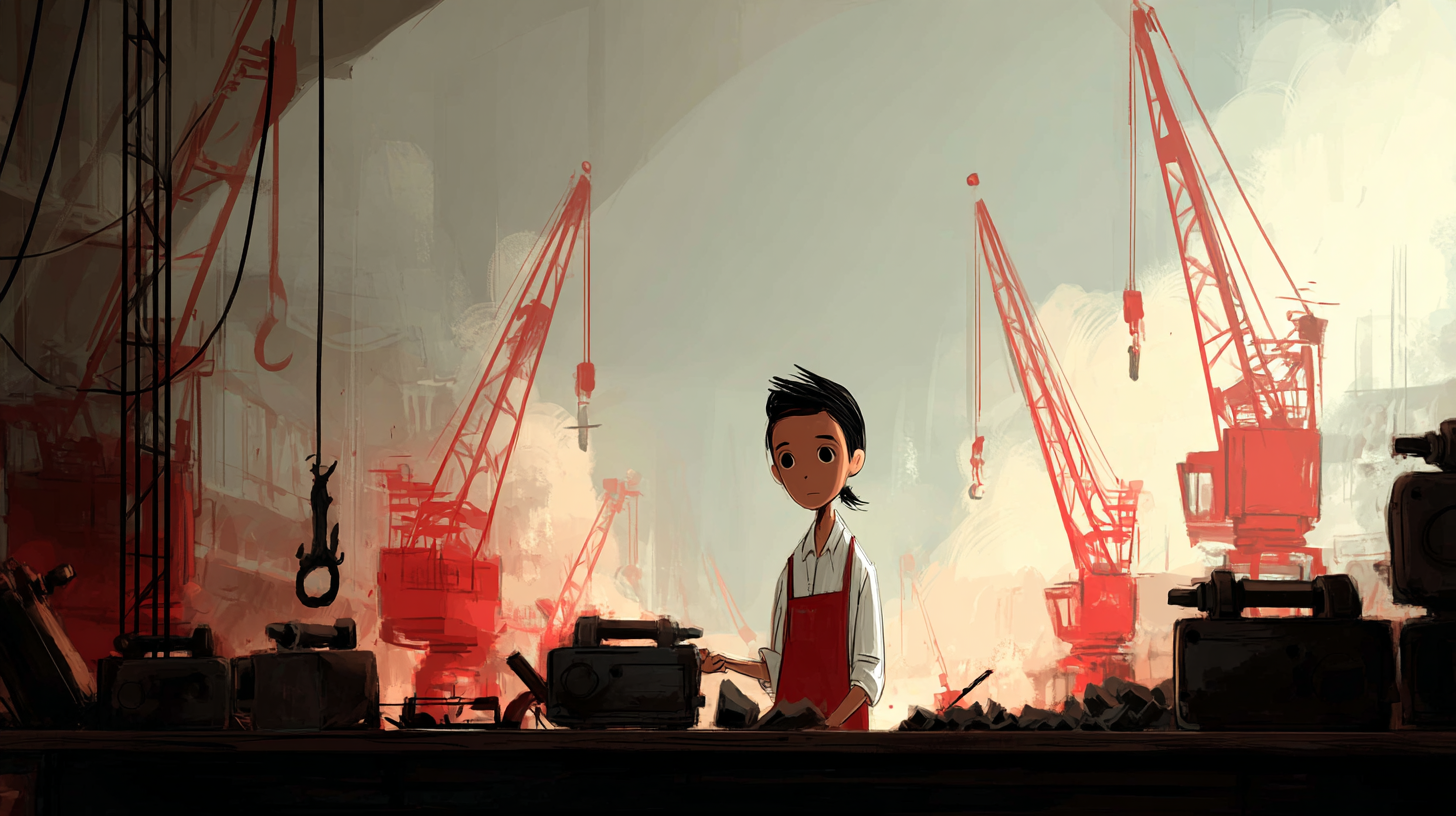“Iron” means a strong metal or the action of making clothes flat with heat.
「iron」は「鉄」や「アイロンをかけること」を表す言葉。
以下は英単語 “” に関するストーリー型学習コンテンツです。まずは大枠の意味を理解して最後の文章で確認しましょう。
主な意味(main meaning)
| 品詞 | 発音(IPA) | 意味 | 例文 |
|---|---|---|---|
| 名詞 (noun) | /ˈaɪ.ən/ | 鉄(金属の一種) | The bridge is made of iron. |
| 名詞 (noun, 可算) | /ˈaɪ.ən/ | アイロン(服を伸ばす道具) | She used an iron to smooth her shirt. |
| 動詞 (verb) | /ˈaɪ.ən/ | アイロンをかける | He ironed his clothes before the meeting. |
語源(etymology)
「iron」は古英語 īsern に由来し、さらにゲルマン語系の言葉にさかのぼる。核となるイメージは「硬い金属」「強さ」。
類義語(synonyms)
| 類義語 | 意味 | 例文 |
|---|---|---|
| steel | 鋼 | The building is supported by steel beams. |
| metal | 金属 | Gold is a precious metal. |
| firmness | 固さ、強さ | Her firmness helped her lead the team. |
| press | プレスする、押す | He used a machine to press the fabric. |
反義語(antonyms)
| 反義語 | 意味 | 例文 |
|---|---|---|
| softness | 柔らかさ | The pillow’s softness made her feel comfortable. |
| weakness | 弱さ | His weakness for sweets made it hard to diet. |
コロケーション(collocations)
| コロケーション | 例文 |
|---|---|
| iron ore | The factory processes iron ore into steel. |
| iron will | She showed an iron will to achieve her dream. |
| iron hand | The leader ruled with an iron hand. |
| iron curtain | The Iron Curtain divided Europe during the Cold War. |
| ironing board | I bought a new ironing board yesterday. |
2項表現(binomials)
| 2項表現 | 例文 |
|---|---|
| iron and steel | The company produces iron and steel for construction. |
| fire and iron | The old city was destroyed by fire and iron. |
英語ストーリー(english story)
Story: “The Iron Factory”
Tom had just started his new job at a small factory in his town. The factory mainly dealt with iron and steel (iron and steel: 鉄と鋼). He was nervous on his first day, but he wanted to show his iron will (iron will: 強い意志) to learn quickly.
The manager, Mr. Brown, explained, “This factory uses raw iron ore (iron ore: 鉄鉱石) from the nearby mountains. We process it into steel beams for buildings.” Tom listened carefully. He had always been interested in how metal (metal: 金属) was changed into useful materials.
During the lunch break, Tom met Jane, another worker. She said, “You need to be careful here. The machines are powerful. They can press (press: 押す) the iron into different shapes.” Tom nodded. He could feel the hardness and firmness (firmness: 固さ) of the iron when he touched a sample.
At home that night, Tom’s mother reminded him, “Don’t forget to look neat tomorrow. Use the iron (iron: アイロン) to smooth your shirt.” Tom laughed. “Yes, Mom, I will iron (iron: アイロンをかける) my clothes.” He took the old ironing board (ironing board: アイロン台) from the closet and carefully ironed his uniform.
The next day, Tom saw Mr. Brown again. The manager praised him, “I like your attitude. You don’t show weakness (weakness: 弱さ). You are not afraid of challenges.” Tom felt happy. He knew he needed to continue working hard.
Weeks passed, and Tom learned more. He discovered that the history of Europe had once been divided by the Iron Curtain (Iron Curtain: 鉄のカーテン). This was interesting because he realized that “iron” was not only a material but also a symbol of power and control. “Some leaders ruled with an iron hand (iron hand: 鉄の手),” Jane explained one day.
Through his work, Tom also realized that balance was important. While iron represented strength, life also required softness (softness: 柔らかさ). When he returned home, he enjoyed sitting on his comfortable pillow, enjoying its softness after a long day at the hard factory.
After a year, Tom had gained confidence. He could now explain the whole process of turning iron ore into strong steel beams. He was no longer the shy boy who started with little knowledge. Instead, he had grown into a young man with an iron will and a clear future.
和訳
「鉄工場」
トムは町の小さな工場で新しい仕事を始めた。その工場は主に鉄と鋼 (iron and steel) を扱っていた。初日は緊張したが、トムは早く学ぼうとする強い意志 (iron will) を示したかった。
工場長のブラウン氏は説明した。「この工場は近くの山から採れる鉄鉱石 (iron ore) を使っているんだ。それを加工して建物用の鉄骨にする。」トムは熱心に耳を傾けた。彼は昔から金属 (metal) がどのように役立つ材料に変わるのかに興味があった。
昼休みにトムは同僚のジェーンに出会った。彼女は言った。「ここでは気をつけてね。機械は強力なの。鉄をいろいろな形に押す (press) ことができるのよ。」トムはうなずいた。鉄のサンプルを触ると、その固さ (firmness) を感じることができた。
その夜、家に帰ると母が言った。「明日もきちんとした格好で行くのよ。服にアイロン (iron) をかけなさい。」トムは笑った。「わかってるよ。服にアイロンをかける (iron) から。」彼は古いアイロン台 (ironing board) を押し入れから出して、丁寧に制服にアイロンをかけた。
翌日、再びブラウン氏に会った。工場長は彼をほめた。「君の態度はいいね。弱さ (weakness) を見せないし、挑戦を恐れていない。」トムは嬉しかった。これからも努力を続けなければならないと感じた。
数週間が過ぎ、トムはさらに学んだ。ヨーロッパの歴史ではかつて鉄のカーテン (Iron Curtain) によって分けられていたことを知った。それは「iron」が単なる物質ではなく、力や支配の象徴でもあることを彼に気づかせた。「ある指導者たちは鉄の手 (iron hand) で支配したのよ。」とジェーンが説明した。
仕事を通じて、トムはバランスの大切さにも気づいた。鉄 が強さを表す一方で、人生には柔らかさ (softness) も必要だ。家に帰ると、彼は長い一日のあとに柔らかな枕に座り、その心地よさを楽しんだ。
1年後、トムは自信をつけていた。鉄鉱石 (iron ore) を強い鉄骨に加工する一連の流れを説明できるようになった。もう知識の少ない内気な少年ではなかった。彼は今、強い意志 (iron will) と明るい未来を持つ青年に成長していた。
Q&A
Q: “iron”と“steel”の違いは?
A: “iron”は純粋な「鉄」、自然界から得られる金属です。“steel”は「鉄に炭素を混ぜた合金」で、より強くて丈夫です。建物や機械には鉄よりもスチールがよく使われます。
Q: “iron”と“metal”の違いは?
A: “metal”は「金属全般」を意味する広い言葉で、鉄・金・銀などを含みます。“iron”はその中の1種類です。
Q: “iron”と“firmness”の違いは?
A: “iron”は物質としての「鉄」を意味します。“firmness”は「固さ」「強さ」「意志の強さ」など抽象的な性質を表します。鉄のように硬いイメージから比喩的に使われます。
Q: “iron”と“press”の違いは?
A: “iron”は名詞で「鉄」や「アイロン」、動詞で「アイロンをかける」を意味します。“press”は「押す」「プレスする」動作を表す動詞や名詞で、物を平らにしたり形を変えたりするときに使われます。
コロケーションとの違い
Q: “iron ore”と“iron”の違いは?
A: “iron”は「鉄」そのものを指します。“iron ore”は「鉄鉱石」、つまりまだ加工されていない岩石の中に含まれる鉄分を指します。
Q: “iron will”と普通の“will”の違いは?
A: “will”は「意志」を意味します。“iron will”は「鉄のように強い意志」という比喩で、あきらめない精神力を強調するときに使われます。
Q: “iron hand”と普通の“hand”の違いは?
A: “hand”は「手」や「力」を意味します。“iron hand”は「鉄の手」という比喩で、「厳しい支配」や「強い統制」を表します。
Q: “iron curtain”と普通の“curtain”の違いは?
A: “curtain”は単純に「カーテン」を指しますが、“Iron Curtain”は歴史的な用語で「冷戦時代にヨーロッパを分けた政治的な境界」を意味します。
Q: “ironing board”と“iron”の違いは?
A: “iron”は服を伸ばす道具そのもの。“ironing board”は「アイロン台」で、服をアイロンがけするときに置く板のことです。



コメント